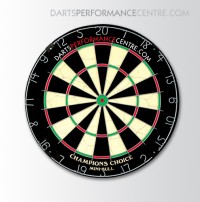
Coaching Clinic 9
Posted: 20.03.12 in Coaching Clinic Blog category
This month we ask you to consider going "back to basics" with your technique and we have a practice game for you too!
We recently went the Dutch Open. Once again we met a fascinating selection of players and added to our ever expanding bank of knowledge about the darts throw. All the players who came to see us had entered either the main tournament or the youth competition and all had varying degrees of darts skills.
Let’s Start at the Very Beginning
It made me realise that 99% of our clients are experienced dart players. With this in mind it was very interesting to be approached recently by a player who had barely picked up a dart before for some advice on the best approach to start her darts training programme.
It also made me consider the fixes we have achieved with some of our “experienced” clients. A lot of what we put right is small errors that have become ingrained and automatic in a player’s technique. The majority of the time the players have no clue there is anything wrong until they see what they are doing on video or we point it out to them.
When we started training the novice player the key basic principles of acquiring a sound technique came to the fore. The areas that our beginner noted down after the session that she felt were the most crucial that we had directed her on were:
· Look at balance and oche position
· Sight line and aiming
· Check weight of darts and try different barrels for comfort
· Throw straight
· Keep everything still except the throwing arm
· Don’t have a beer first (it was 2pm!)
Her final thoughts were
“I decided to stand with both feet flat on the floor for comfort and balance and consistency and to have my foot at 45 degrees as I have waddling feet and putting it parallel to the oche hurt my knee”!
Back to basics is a well known cliché. Many clichés survive and are also very useful in coaching because they sum up a truth. A lot of players we have met could have benefitted from imagining they are once again setting off on their first few tentative steps to mastering darts. It could perhaps be something our readers look into in case they are assuming that they correctly fulfil all the areas our novice player has highlighted as integral to accelerate her learning a “perfect” technique.
Practice Makes What?
To master darts you do have to practise, surely that is one area of darts that we all agree on? We are often asked about practice games or players send us details of their favourite games. On one hand a player practising anything that involves hurling a dart at a board has to be a positive thing we agree with that. On the other hand, practice time is a very valuable commodity to most of our clients who have a full time job, school or university to also contend with! So make the most of the time you have.
The core practice games of our website focus on the core areas of winning a darts match-power scoring, finishing and learning to count. The games are also “back to basics”, you don’t have to hit three treble ones (when do you do that in a match?), stand on your head or stick to any other bizarre scoring systems. You just practise the skills that win you darts matches.
However, we also realise practice needs to be stimulating, fun and challenging so our core games are not enough to sustain a player with a decent amount of time to practise. Our advice on what games you do use is to look at what skills or areas of technique are present in the game that you have to use in a match.
If you can name one, two or more, great, practise away.
Here is a game we recommend!
The Metalhead Power Scoring Game
 General Like all good practice games the rules can be adapted to suit the standard of each player taking part, we will explain more about that later. You need a dart board and a score board
General Like all good practice games the rules can be adapted to suit the standard of each player taking part, we will explain more about that later. You need a dart board and a score board
Number
Any number of players can play but probably a maximum of four keeps the game flowing.
Set Up
Write each player's name, side by side on the score board.
Scoring
In turn each player throws their three darts. This is Metalhead's scoring system when he plays against the PDC players.:
A score of 100 plus - 1 point
A score of 140 plus - 2 points
A score of 180 - 3 points
Winner
First player to hit 25 points
Adapt the Game
If you practise with a player who is still mastering the game, change the scoring system. For example the novice player could get 1 point for a score of 40 plus, 2 for 60 plus and 3 for a 100 for example. This way the better player is put under pressure which makes the game not just more competitive and fun but it is far more valuable practice, for both players!
The game opens your eyes to exactly how many darts you throw straight and how many drift! You can practice your grouping and pre-shot routine. If you are playing as a group of 4 imagine it is a pairs match and practise keeping your focus and concentration as you wait your turn.
If you treat your practice time seriously you will reap the rewards!
..............................................................................................................................................
The Darts Performance Centre is a resource to assist dart players of all standards play better darts. The site is arranged as an on-line coaching manual. There is advice on technique, nerves, psychology, goal setting, practice games, an area to log your statistics and an interactive area where your darting questions are answered by two sports scientists, one with 30 years dart playing experience! Membership is just £25.00 per annum.
Post by Category
Posts by Month
- November 2025
- October 2025
- September 2025
- August 2025
- July 2025
- June 2025
- May 2025
- April 2025
- March 2025
- February 2025
- January 2025
- December 2024
- December 2024
- November 2024
- October 2024
- September 2024
- August 2024
- July 2024
- June 2024
- May 2024
- April 2024
- March 2024
- February 2024
- January 2024
- December 2023
- December 2023
- November 2023
- October 2023
- September 2023
- August 2023
- July 2023
- June 2023
- May 2023
- April 2023
- March 2023
- February 2023
- January 2023
- December 2022
- December 2022
- November 2022
- October 2022
- September 2022
- August 2022
- July 2022
- June 2022
- May 2022
- April 2022
- March 2022
- February 2022
- January 2022
- December 2021
- December 2021
- November 2021
- October 2021
- September 2021
- August 2021
- July 2021
- June 2021
- May 2021
- April 2021
- March 2021
- February 2021
- January 2021
- December 2020
- December 2020
- November 2020
- October 2020
- September 2020
- August 2020
- July 2020
- June 2020
- May 2020
- April 2020
- March 2020
- February 2020
- January 2020
- December 2019
- December 2019
- November 2019
- October 2019
- September 2019
- August 2019
- July 2019
- June 2019
- May 2019
- April 2019
- March 2019
- February 2019
- January 2019
- December 2018
- December 2018
- November 2018
- October 2018
- September 2018
- August 2018
- July 2018
- June 2018
- May 2018
- April 2018
- March 2018
- February 2018
- January 2018
- December 2017
- December 2017
- November 2017
- October 2017
- September 2017
- August 2017
- July 2017
- June 2017
- May 2017
- April 2017
- March 2017
- February 2017
- January 2017
- December 2016
- December 2016
- November 2016
- October 2016
- September 2016
- August 2016
- July 2016
- June 2016
- May 2016
- April 2016
- March 2016
- February 2016
- January 2016
- December 2015
- December 2015
- November 2015
- October 2015
- September 2015
- August 2015
- July 2015
- June 2015
- May 2015
- April 2015
- March 2015
- February 2015
- January 2015
- December 2014
- December 2014
- November 2014
- October 2014
- September 2014
- August 2014
- July 2014
- June 2014
- May 2014
- April 2014
- March 2014
- February 2014
- January 2014
- December 2013
- December 2013
- November 2013
- October 2013
- September 2013
- August 2013
- July 2013
- June 2013
- May 2013
- April 2013
- March 2013
- February 2013
- January 2013
- December 2012
- December 2012
- November 2012
- October 2012
- September 2012
- August 2012
- July 2012
- June 2012
- May 2012
- April 2012
- March 2012
- February 2012
- January 2012
- December 2011
- December 2011
- November 2011
- October 2011
- September 2011
- August 2011
- July 2011
- June 2011
- May 2011
- April 2011
- March 2011
- February 2011
- January 2011
- December 2010
- December 2010
- November 2010
Main Index







.jpg)


